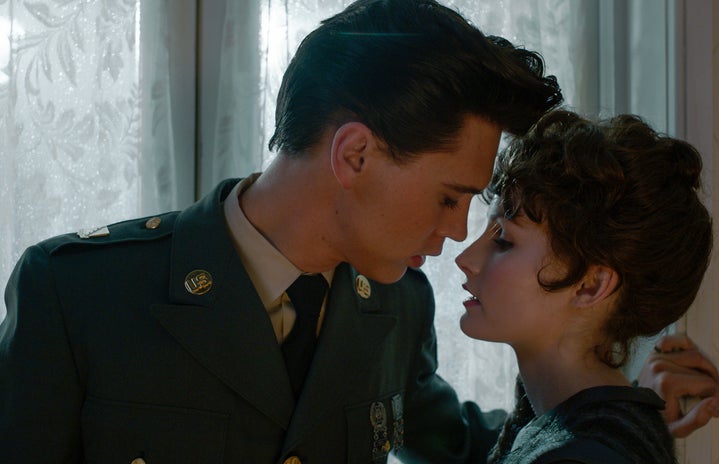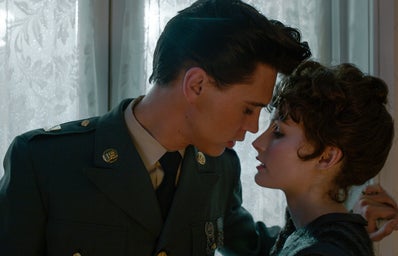After watching Sofia Coppola‘s rendition of Priscilla Presley‘s life, I think it’s safe to say that the entire story is a tragedy. This was my first time watching a movie by this director and I feel that there’s a 1950s aesthetic, style and overall ambience that is captured by her perfectly. This is achieved through her use of beautiful pastel colours and soft background music.
For those not familiar, Elvis Presley was one of the most famous singers in 1950s America. A lot of his story is shrouded in secrets and this adaptation of his life picked up on elements such as addiction, anger issues and abusive tendencies. Priscilla was a producer on the film and the events are based on her memoir “Elvis and Me” which focussed on their relationship. The couple met whilst he was completing his military service in Germany when Priscilla was 14, and he was 24 and the two immediately started a relationship. Baz Luhrmann’s telling of Elvis’ story in 2019 delves more into his life as a celebrity, his music and the controlling nature of his manager, Colonel Tom Parker. However, Coppola takes a completely different approach and speaks more to the dark side of this public figure. Due to the age difference in the relationship and the celebrity status of Elvis, there’s an immediate imbalance of power and after the two meet, subtle comments are made to control Priscilla. As the film continues it becomes increasingly clear that Elvis enjoys having a wife and eventually a child but only when it’s convenient for him.
Another particularly impactful scene was when Elvis was buying new clothes for Priscilla, at first it seemed to be a kind gesture but as the scene continued, he began to criticise the clothes and how they made her look. He also took that opportunity to ensure she had jet-black hair heavily doused in hairspray and severe makeup, including her signature eyeliner. For context, this is the complete opposite of her previous mousey brown hair and felt more like an attempt to give Priscilla the unofficial “Elvis branding”.
An integral part of this movie is the house that Elvis owns: “Graceland”. In Baz Luhrmann’s “Elvis” the house was full of joy and life however in this movie which portrays Priscilla’s reality, it’s empty and desolate. Like a pastel paradise gone completely wrong. Every time Elvis returns from touring, the house lights up but Priscilla’s existence was seemingly a very lonely one at that
point in her life. As a member of the audience, it felt in a way, like watching a horror film. You could see all the mistakes that she was making, and every comment Elvis made that should’ve set off a warning which she ignored because she was young and in love.
After realizing that her husband would never value her the way that she deserved, she files for divorce and states ‘If I don’t leave now, I never will’. The only element of the story that I resented was the sudden conclusion: the last scene we are shown is Priscilla driving out of Graceland paired with the song ‘I Will Always Love You’ sung by Dolly Parton. Some reviews of the film describe this as an empowering moment for her as she literally “drives out of his domain” and into the world. In contrast, I felt quite disappointed by this as it felt that the abrupt ending was in a way a metaphor for Elvis’ treatment of Priscilla. The narrative reinforces that she’s a background character in her own life and the story isn’t worth telling any further unless she has any association with the so-called ‘king of rock and roll’.


